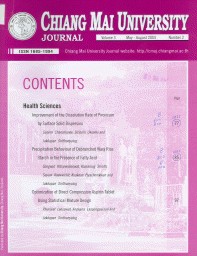ThaiScience
ThaiScience
CHIANG MAI UNIVERSITY JOURNAL OF NATURAL SCIENCES
Volume 19, No. 03, Month JULY, Year 2020, Pages 456 - 468
Thunbergia laurifolia lind. extract alleviates motor impairments in acute mptp mouse model of parkinson’s disease
Thanasit Chaiwut, Pornarez Thaweekhotr, Chanida Thongsopha, Noppadol Phasukdee, Sumitra Gomonchareonsiri, Nitaya Boontim, Napuskorn Sanpow, Chainarong Tocharus and Ranida Quiggins
Abstract Download PDF
Parkinson’s disease (PD) is a neurodegenerative disease whereby there is the characteristic progressive degeneration of dopaminergic neurons in the substantia nigra pars compacta (SNpc) leading to motor deficiencies. The 1-methyl-4-phenyl-1, 2, 3, 6-tetrahydropyridine (MPTP), is the neurotoxin that was used to induce the mice to be models of PD. Thunbergia laurifolia Lindl. (TL) is a Thai herbal medicine which is used for reducing the effects of toxins. This study aims to find out whether TL leaf extract can prevent the onset of PD motor impairments due to MPTP by using pre TL and post TL treatments and observing the mouse’s latency times on the Rotarod test, the frequency of movements on the Motor Activity Test, and the numbers of the dopaminergic neurons on the tyrosine hydroxylase immunoreaction (THir+) The results showed that the latency times and motor activity of the pre TL treated group were significantly higher than that of the pre-vehicle treated group at P < 0.01. On the other hand, there was no difference between those of the post TL and the post vehicle treated groups. The number of THir+ neurons of pre TL and post TL treated groups were significantly higher than that of their vehicle treated groups, yet the number of the pre TL treated group was less different (P < 0.05) than that of the post TL treated group (P < 0.01) when compared with the control. In conclusion, we have determined that the pre-treatment of TL extract in the MPTP mouse model of PD alleviates motor impairments.
Keywords
Thunbergia Laurifolia Lind., Motor impairments, Parkinson’s disease, Dopaminergic neuronsCHIANG MAI UNIVERSITY JOURNAL OF NATURAL SCIENCES
Published by : Chiang Mai University
Contributions welcome at : http://cmuj.cmu.ac.th
